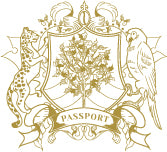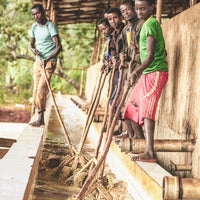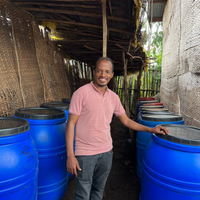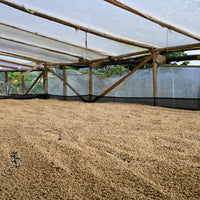Rwanda Kanyege
Origin: Rwanda
Region: Nyakabingo
Town: Nyamasheke
Altitude: 1800 - 2100 meters above sea level
Washing Station: Kanyege
Owner: 940+ Small holder farmers
Variety: Bourbon
Process: Natural
Tasting Notes: Crisp, Full and Winey with notes of berries, spice, cocoa and black tea.
The Kanyege washing station is situated near the town of Nyamasheke in the Nyakabingo region of Rwandaas Western province. The station is situated 1920m above sea level and collects cherry from 940 farmers who typically have less than 2 acres of land between 1800 - 2100 meters above sea level in the surrounding hillls.
In order to reach Kanyege washing station, the last kilometer or so must be traveled on foot. The path is lined with plots of healthy Bourbon trees set on a hilly landscape. Between December and May the branches of the trees are weighed down with cherry that becomes redder and redder as the season goes on. Soon, those perfectly red cherries will be picked and delivered to Kanyege washing station. Cherry delivered to Kanyege comes from farms at altitudes between 1,800 and 2,100 meters above sea level.
Rwacof (Sucafina Rwanda) purchased the station in late 2017. The following season was a difficult one for farmers in the Nyamasheke region due to the convergence of a periodic low cycle and a severe hailstorm that lowered production by 40%.
The 2019 season saw great recovery for farmers and the station alike. Volumes are up and the cup quality remains among the best in the country.
Kanyege washing station is part of Sucafina Rwanda’s Farm Management project. The project trains casual workers in best agricultural practices and connects them with farmers. Workers can help farmers with activities such as pruning, fertilzer and pesticide application and harvesting. During the season, casual workers are paid by Sucafina Rwanda. Then, when farmers deliver their cherry to Kanyege washing station or another Sucafina Rwanda station, they repay Sucafina Rwanda for the labor they received during the season.
Cherry is selectively handpicked by farmers and delivered to Kanyege washing station. At intake, the station floats all cherry to remove any low-density cherry. Then, the high-density cherry is hand sorted to remove any visible defects. Cherry is then dried on raised beds for 14-16 days.
Rwacof invests heavily in farmer training and good agricultural practices, primarily through our sustainability partner, the Kahawatu Foundation. Rwacof’s Farmer Field School shares information with all their producer partners on best agricultural practices, conservation tactics, the importance of picking only ripe cherry and more.
Furthermore, Rwacof invests significant focus and resources on improving the financial situation of the farmers with whom they work. Annual bonuses are always distributed once the coffee is sold; however, as part of Sucafina’s innovative Farmer Hub program, instead of giving these second payments in cash, Rwacof has negotiated favorable rates with a wide-reaching African bank. Thanks to this new partnership, farmers are equipped with zero-fee accounts that have no monthly account maintenance fees, no transfer costs and no withdrawal costs. Their new bank accounts not only mean more secure storage for their money, but it makes them bankable and eligible for other credit lines, often for the first time.
Above all, Rwacof ensures the best quality coffee through their exceptional attention to detail during post-harvest activities. From the moment that the coffee cherry enters the washing station until it is milled and bagged for export, Rwacof keeps stringent quality controls in place. They know, as we do, that high quality coffee is crucial for delivering benefit all along the supply chain.
Our sustainability partner foundation, Kahawatu Foundation, complements the work of Rwacof in training farmers on good agricultural practices and providing health and safety education.
Despite its turbulent history, today Rwanda is one of the specialty coffee world’s darlings – for good reason! Rwacof in Rwanda does an amazing job of bringing the best that Rwanda has to offer to roasters around the world.
Rwacof invests heavily in farmer training and good agricultural practices, primarily through our sustainability partner, the Kahawatu Foundation. Rwacof’s Farmer Field School shares information with all their producer partners on best agricultural practices, conservation tactics, the importance of picking only ripe cherry and more.
Furthermore, Rwacof invests significant focus and resources on improving the financial situation of the farmers with whom they work. Annual bonuses are always distributed once the coffee is sold; however, as part of Sucafina’s innovative Farmer Hub program, instead of giving these second payments in cash, Rwacof has negotiated favorable rates with a wide-reaching African bank. Thanks to this new partnership, farmers are equipped with zero-fee accounts that have no monthly account maintenance fees, no transfer costs and no withdrawal costs. Their new bank accounts not only mean more secure storage for their money, but it makes them bankable and eligible for other credit lines, often for the first time.
Above all, Rwacof ensures the best quality coffee through their exceptional attention to detail during post-harvest activities. From the moment that the coffee cherry enters the washing station until it is milled and bagged for export, Rwacof keeps stringent quality controls in place. They know, as we do, that high quality coffee is crucial for delivering benefit all along the supply chain.
Although Rwanda’s colonial past is central to the introduction of coffee in the country, due to Rwanda’s landlocked position close to the center of Africa, few Europeans actually set foot in the country until well into the mid-1890s. Even after the 1885 “Conference of Berlin” when Germany declared control over the areas of modern Burundi and Rwanda, the first documented European traveler to ever set foot in Rwanda did not arrive until 1894.
German missionaries and settlers brought coffee to Rwanda in the early 1900s. Largescale coffee production was established during the 1930 & 1940s by the Belgian colonial government, who officially controlled the Belgian Congo from 1908 to 1960 and the twin territory of Ruanda-Urundi (that later became the countries of Rwanda and Burundi) from 1922 until independence in 1962.
The Belgian government made coffee growing mandatory during their rule. The Belgians forced native Rwandans to grow coffee in order to produce cheap, plentiful, low-quality coffee for export. Most of the profits from coffee production left Rwanda, along with the coffee itself.
When the Belgian government withdrew, many stopped tending their trees because it was no longer compulsory. For some, coffee was seen as a symbol of colonial oppression. However, many also saw the economic advantages of continuing to grow coffee, and the industry quickly became important to Rwanda’s national economy.
Coffee production continued after the Belgian colonists left. By 1970, coffee had become the single
largest export in Rwanda and accounted for 70% of total export revenue. Coffee was considered so
valuable that, beginning in 1973, it was illegal to tear coffee trees out of the ground.
Between 1989 and 1993, the breakdown of the International Coffee Agreement (ICA) caused the global price to plummet. Considering the massive role that coffee played in Rwanda’s income, the government and economy took a hard hit from low global coffee prices. The 1994 genocide and its aftermath led to a complete collapse of coffee exports and vital USD revenue. But the incredible resilience of the Rwandan people is evident is the way that the economy and stability have recovered since then.
Modern Rwanda is considered one of the most stable countries in the region. Since 2003, its economy has grown by 7-8% per year and coffee production has played a key role in this economic growth.
This incredible recovery is due in part to the strong government support for the coffee sector as well as trade rules helping exports and international investment into the coffee sector. About ten years after the end of the civil war, the government instituted the National Coffee Strategy that helped improve and expand the coffee industry. The strategy encourages high-quality production for the specialty coffee market. Funding comes from the Rwandan government, other nations and private investors. Economic outcomes for farmers are now much better than they once were.
Previously, Rwandan coffee farmers processed their cherry at home. They would roughly de-pulp the cherry, wash it, maybe ferment it and probably dry it on the floor. This created a very low-quality commodity coffee called semi-washed. To improve the quality of coffee, the government incentivized the creation of new Central Washing Stations (CWSs) in coffee-producing areas. The first CWS was established in 2001. Today, more than 300 washing stations operate across Rwanda.
The growth of washing stations and the improvement in processing for Rwandan coffees has added at least a 40% premium to Rwandan coffee’s export value.
Today, smallholders propel the industry in Rwanda forward. The country doesn’t have any large estates. Most coffee is grown by the 400,000+ smallholders, who own less than a quarter of a hectare. The majority of Rwanda’s coffee production is Arabica. Bourbon variety plants comprise 95% of all coffee trees cultivated in Rwanda.
A significant barrier to Rwanda’s expanding coffee industry is transportation. Since Rwanda is landlocked, coffee must first travel 1,500 kilometers by land to either Mombasa, in Kenya, or Dar-es-Salaam, in Tanzania. This is a lengthy and expensive process that usually costs more than it does to ship the same container of coffee from those ports to the US or Europe.
Despite the expense of transportation, Rwandan farmers are doing well. Many farmers who deliver cherry and participate in washing station programs have seen their income more than double. Additionally, the first Rwandan Cup of Excellence was held in 2008 and has since then only continued to gather traction and interest for the country’s exceptional Bourbon coffees.
Rwanda has seen significant developments in gender equity and coffee has played a role in these advancements. While women previously lost their control over agriculture during colonial rule due to gender-assumptions made by European rulers, they are starting to regain some autonomy in agriculture. New initiatives that cater to women and focus on helping them equip themselves with the tools and knowledge for farming have been changing the way women view themselves and interact with the world around them.







